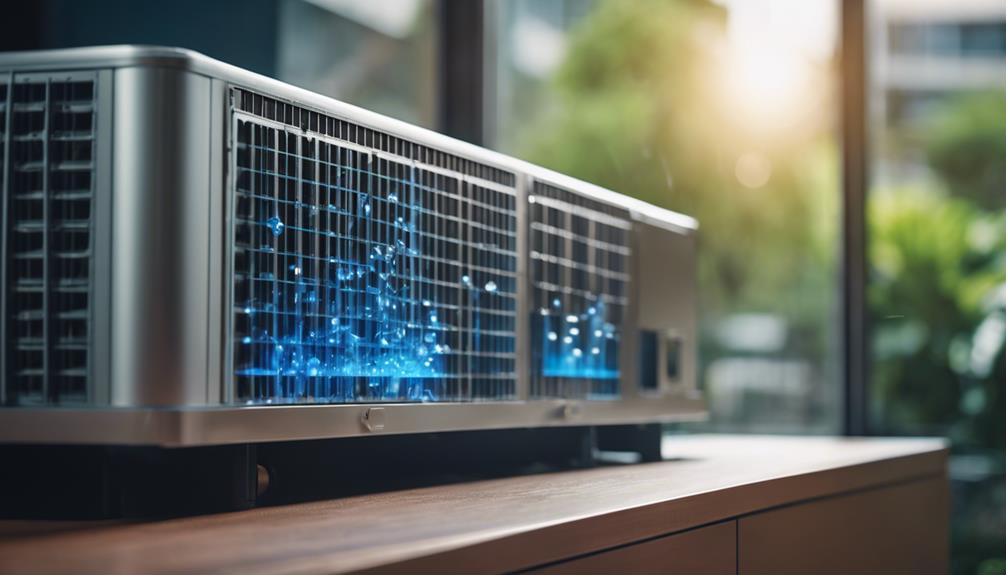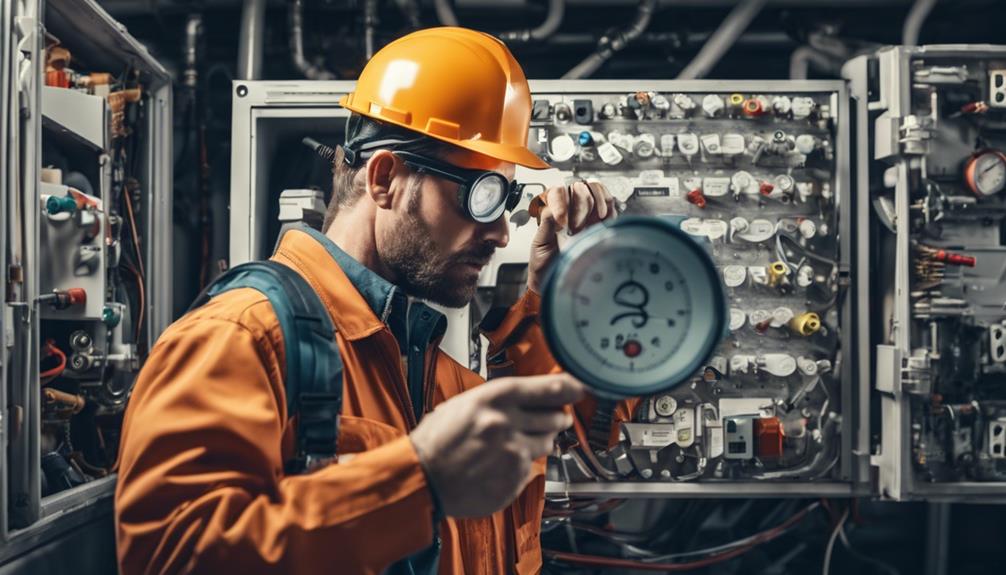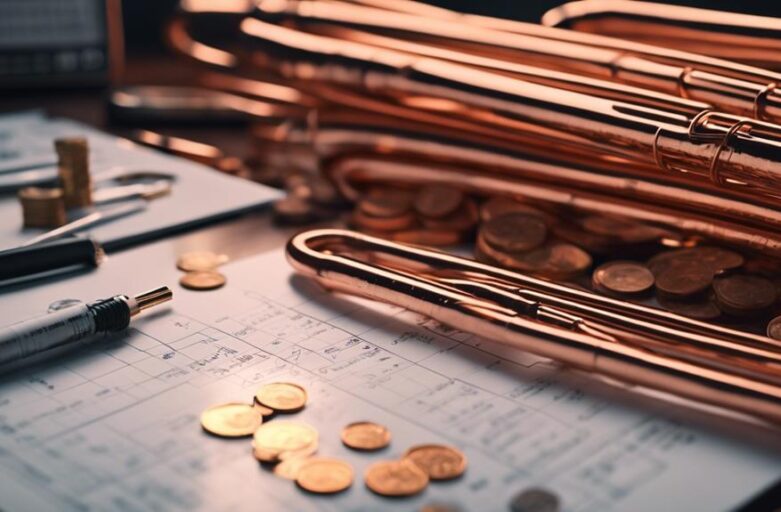There are seven important things that can change the price of your plumbing and HVAC inspection.
First, how old your system is matters – older ones might need more looking at.
Second, when it's a busy season, the price can go up.
Third, the size of your unit and how well it works can change the cost.
Fourth, how much pressure your system is under can make a difference.
Fifth, where you live can affect the price.
Sixth, the kind of inspection you need can cost different amounts.
Lastly, don't forget extra charges for other services.
Knowing these things can help you plan and save money. Each of these seven things can change the price in its own unique way.
Key Takeaways
- If your heating and cooling system is old, it might cost more to check because it might need more repairs.
- When the weather is very hot or cold, many people want their systems checked. This high demand can make the cost go up.
- Big heating and cooling systems that don't work very well can cost more to check.
- How hard your system works, including its pressure and efficiency, can change the cost. If it works too hard, it might not last as long and could cost more to inspect.
- Where your house is, what type of heating and cooling system check you need, and any extra services like new parts or special checks can make the cost go up.
Age of the HVAC System
Ever wondered how your HVAC system's age affects how well it works and how much it costs you? As your system gets older, it's not just about counting years. It's about how much use it's had and how that affects its parts. Older systems have been used a lot, so they might need more repairs because parts can break down over time.
So, the older your system, the more likely it's that something might go wrong.
Older systems might also need more check-ups to keep them working well. These check-ups are important because they can spot problems early, before they get really big and expensive to fix.
You might be thinking, 'But aren't check-ups expensive?' They can be, but isn't it better to fix small problems before they become big ones?
Seasonal Demand Variations
Just like how the weather changes with the seasons, so do the needs for heating and cooling services. This affects when you can get an inspection and how much it might cost. You might've noticed that during hot summers and cold winters, these services are in high demand. This is because extreme weather can cause your heating or cooling system to break down, leading to many emergency calls. When there are lots of people needing help, the inspection costs can go up.
It's not just about being comfortable in your home. It's about staying safe. When the heating or cooling system doesn't work in extreme temperatures, it can be dangerous. Service providers know this, and it can make prices go up during busy seasons.
But there's good news too. When the weather is mild in spring and fall, you can often find discounts for inspections. This is because there are fewer people needing services, so companies might lower their prices to bring in more customers. If you schedule your inspections during these times, you might be able to save some money.
Knowing how the seasons affect the need for heating and cooling services can help you plan when to get inspections. This can make sure you get good service without spending too much money.
Efficiency and Size of the Unit

In simple terms, the size and how well your HVAC unit works can affect how much you spend on fixing and taking care of it. A unit that uses less energy is good because it's kinder to the planet and it costs less to run, so it's cheaper to fix too. Bigger units usually cost more to service than smaller ones.
But remember, bigger doesn't always mean better. Units that are just the right size cost less to fix and take care of. If your unit is too big or too small, it can cost more to run and work less effectively. So it's important to have one that's just right.
How well your HVAC unit works can make a difference to your pocket. That's why it's important to take care of it regularly. Something as simple as changing the air filter can make your unit work better and cost less to run. Plus, it can make your home a more pleasant place to live in.
Applied Force on the System
Let's dive into understanding how the force we put on our heating and cooling system affects it.
Imagine how much strain your system experiences every time it starts up; this can change how well it works and how long it lasts.
We'll learn how to handle this force to make sure your system keeps working well and to save on repair costs.
System Pressure Impact
Knowing how system pressure affects your heating or cooling system is really important. If your system works too hard, it could break down faster and fixing it can get pretty expensive. One simple way to help is to turn off your heat or air conditioning when you're not at home. This cuts down on the stress on your system and helps it last longer.
Keeping your HVAC system from running too much is a smart choice. It doesn't just stop it from being used too much, it also saves energy. Remember, making your HVAC system work too hard doesn't just make your bills higher. It also makes it break down more often.
Force and Efficiency
Taking care of your HVAC system, which controls your heating and cooling, is very important. If you push it too hard, it can break down faster and cost more to fix. It might even stop working sooner than it should.
One easy way to help your HVAC system last longer is to turn it off when you're not home. This lowers the strain on the system, helping it to last longer. Regular check-ups can also stop it from working too hard, keeping it at its best.
Be a smart house owner! Not pushing your HVAC system too hard isn't just about preventing it from breaking down. It's about making sure it works efficiently, lowering your energy bills, and helping it last longer. The smart choices you make now can save you a lot of money in the future.
Geographic Location of Property

Your house's location on the map can change how much you pay for checks on your heating, cooling, and water systems. If your neighborhood is an expensive place to live, the people who check these systems might ask for more money for their time.
The number of these workers in your area can also change the price. If there are many of them, you might pay less because they're all trying to get your business. But if there aren't many, they can ask for more money because they know you don't have many other options.
The time of year can change the price too. When it's really hot or really cold, more people want their heating and cooling systems checked. This can make the price go up. So, think about these things when you're planning when to have these checks done.
Type of HVAC Inspection
The cost of checking your heating, ventilation, and air conditioning (HVAC) systems can vary. The price depends on where your home is and what kind of check-up your system needs. For example, you might need to check your air ducts, attic fan, roof vent, boiler, furnace, or your air conditioning unit. Even special systems like underfloor heating need their own special checks.
The price for each type of check-up is different. For instance, looking at your roof vent could cost between $75 and $125. If you need your air conditioning unit checked, it could cost up to $150.
It's very important to make sure your HVAC systems are working properly. Professional check-ups can make sure everything is working as it should be. They can also help your equipment last longer. This is why it's a good idea to get your HVAC systems checked regularly. Even though it might seem expensive, it's a good investment. It helps to keep your home comfortable, safe, and in good condition.
Additional Service Costs

Taking care of your HVAC system can sometimes have extra costs. These prices can change a lot but are really important to make sure your HVAC system works well.
Here's a list of some of these extra costs:
| Service | How Much It Costs | Why It's Important |
|---|---|---|
| New Refrigerant | $150 – $450 | It helps with cooling |
| Fixing Electrical Parts | $150 – $500 | It keeps the system working |
| Regular AC Checkups | $100 – $300 | It helps the system last longer |
| Evaporator Coil Checkups | Different Prices | It stops the system from breaking |
| Other Repairs and Changes | Different Prices | It can stop bigger costs in the future |
From this table, you can see that getting new refrigerant or fixing electrical parts can cost a bit. But regular AC checkups and evaporator coil checkups are really important to avoid bigger costs for fixing the HVAC system in the future.
Conclusion
To wrap it up, the cost of checking your heating and cooling system can be influenced by several factors. This includes how old your system is, the time of the year, the size and efficiency of the system, how much it's used, where your house is located, the kind of check-up needed, and any extra services you might want.
Knowing about these things can help you avoid unexpected costs and ensure your system works perfectly. After all, keeping your system in good condition is very important for a comfortable and worry-free house.


